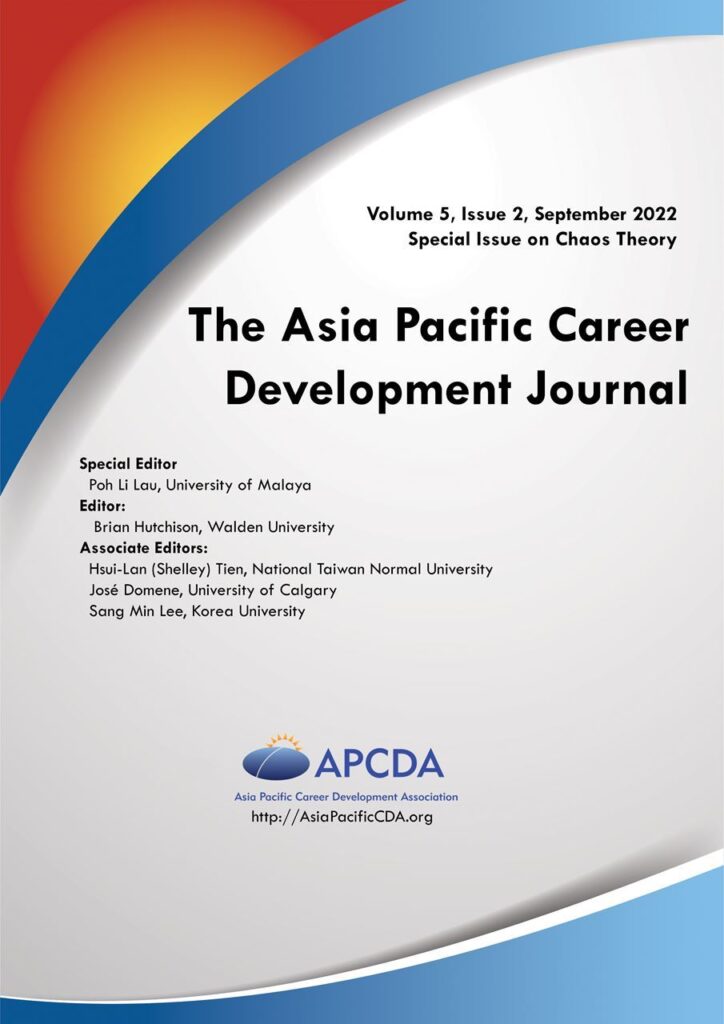The Asia Pacific Career Development Journal, Vol 5, No 2
Vol 5 No 2 (2022): September 2022 Issue
Published: 2022-09-22

Abstract: As the world slowly pulls out of the pandemic, we are acutely aware of the role of unexpected events on our lives and this special issue of the APCD Journal focused on the Chaos Theory of Careers helps us to understand the changes we are facing.
Lead Article
Jim E.H. Bright, Robert G.L. Pryor, and Olivia Pennie
Abstract: The history of the chaos theory of careers is presented in the context of a critique of many extant practices that have dominated the field. The practice of matching models and attendant psychometric interests testing is critically evaluated, and the premises underlying such approaches are explored and questioned. The importance of narratives and stories is explored and considered in terms of complementarity rather than competition with other approaches. It is argued that the field of career development, as a whole, still has a long way to go in terms of fully appreciating the inherent nature of change, complexity, and attendant uncertainty. It is argued that this is essential if the field is to develop appropriate methods of counselling and education that take into account these realities, and that so doing has significant implications for current and future practice, methods, and tools. The paper concludes with a practical example of how the chaos theory of careers can be employed in innovative and effective career educatio
Emprical Articles
Hsiu-Lan Shelley Tien, Tiantian Li, Jiyou Gu, and Juanjuan Wang
Abstract: The purpose of the study was to test the reliability and validity of the Career Chaos Inventory (CCI) in China. The original scale was developed by Tien (2017) in Taiwan. Although the cultures are quite similar to each other, we still want to make sure if the CCI developed in Taiwan can be applied appropriately in China. The CCI, totaling 36 items, was composed of three subscales, complexity awareness, repetition and constant, and chances and action. To test the reliability and validity in China, we invited a total of 725 adults to fill out the CCI. Some inventories were also applied to examine the criterion correlated validity. They were Meaning of Life Questionnaire (MLQ), Satisfaction with Life Scale (SWLS), Job/Learning Satisfaction Scale (J/LSS), Career Adapt-Abilities Scale (CAAS), and Personal Growth Initiative Scale (PGIS). For the item analysis of the CCI, the item total correlation coefficients were between .68 and .88, and all items were retained. We then conducted an exploratory factor analysis, it extracted five components, and explained 63.36% of the total variance. The confirmatory factor analysis showed that the five-factor model fit well (c2/df = 3.767, SRMR = .062, RMSEA = .050, 90% CI = [.058, .066], TLI = .910, CFI = .921). The five-factor model with 24 items, rather than the original three-factor model fit the Chinese people better. In addition, the concurrent validity results showed that CCI was positively correlated with MLQ, SWLS, J/LSS, CAAS, and PGIS scores (.13 < r < .42, p<.01). The Cronbach’s alpha coefficient of CCI was .85, and the coefficients for the five subscales ranged from .75 to .91. Therefore, we concluded that the CCI was a reliable and valid assessment for career chaos perception, and was suitable to be applied for Chinese people.
Jon Schlesinger, Zachary Vigliani, and Sandra Sylvestre
Abstract: Career courses have a long history in higher education (Reardon et al., 2020) and remain an effective means of service delivery (Reese & Miller, 2006); yet, few authors have described the career theories used to develop the course (Reese & Miller, 2006). This study was an exploration of a career course based on the Chaos Theory of Careers (CTC; Bright & Pryor, 2005; Pryor & Bright, 2011) at a medium-sized R1 institution in the northeastern United States. The course was designed to help students understand their own emerging patterns of interest, gain comfort with the uncertain and complex nature of their chosen career, and develop confidence in taking their next steps. Using the Career Decision Self-Efficacy Short Form (CDSE-SF; Betz & Taylor, 2001) as a pretest and posttest, the self-efficacy of 41 undergraduates was measured to evaluate the impact of the course. Participants ranged in age from 18 to 25 years old. Nineteen participants identified themselves as women (46%) and 22 identified themselves as male (54%). A paired-sample t-test was done to compare students’ self-efficacy before and after the course. Initial results suggest that the course is effective in helping students gain self-efficacy and that CTC can be effectively implemented in a classroom setting. Limitations and implications for practice are discussed. | 30 – 40 |
The Asia Pacific Career Development Journal (APCDJ) is an international biannual publication dedicated to all career development and intervention related topics. It is the official journal of the Asia Pacific Career Development Association (APCDA;
